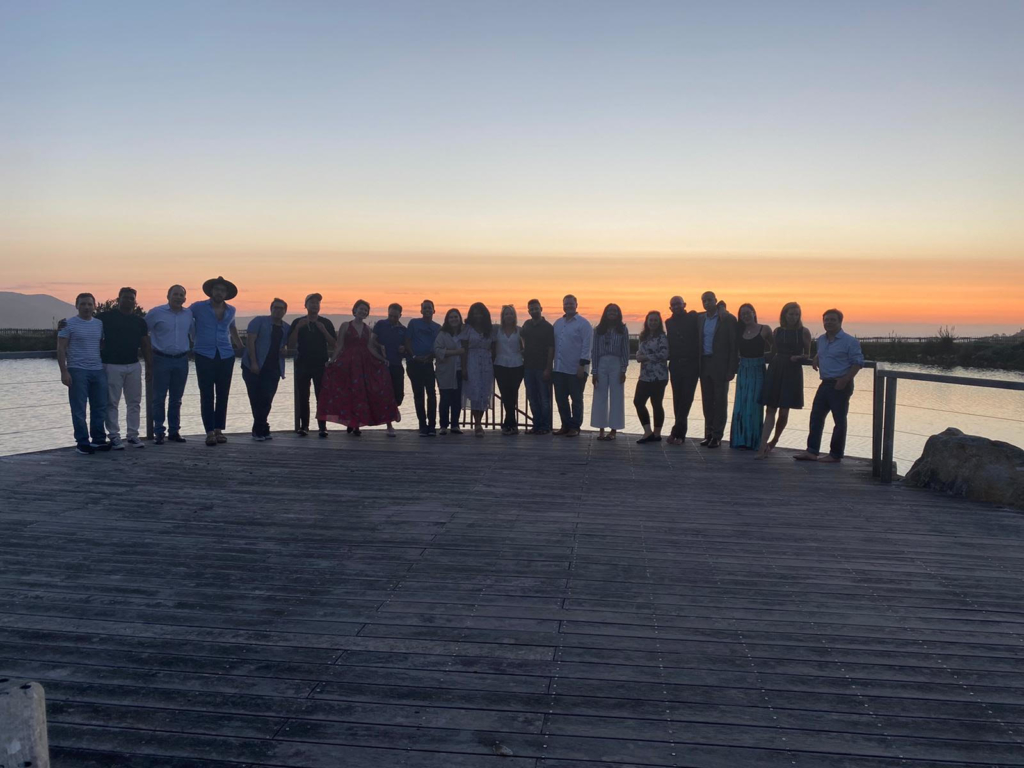
Participants in the IE Brown Entrepreneurial Opportunities in Developing Regions program pose in a vineyard near Cape Town, South Africa. Courtesy photo
For over a decade, joint IE Brown Executive MBA program students spend a week in Cape Town, South Africa, with the purpose of making a meaningful impact.
As part of their Entrepreneurial Opportunities in Developing Regions class, students come up with innovative business solutions to better the quality of life for township residents. But this is no easy feat in a country with a history of racial injustice, and where the effects of the apartheid are still heavily felt.
“Many students have ideas of what might work,” says Gayle Allard, professor of managerial economics in IE Brown’s Executive MBA. “But once in the new environment, they often discover that their ideas aren’t culturally appropriate and they have to start all over again.”
This capstone and immersion experience takes place every January, where small groups of approximately five students are assigned to a project that helps to improve the quality of life for township residents. Some of these projects include helping nursery schools grow by using government incentives, improving early childhood development centers’ day-to-day management, and addressing technological issues in private savings clubs.
GAINING SKILLS TO BECOME HIGH-IMPACT LEADERS
Before students leave for Cape Town, they have a few months in advance to review their projects’ progress made by past cohorts. “The idea was that when we hit the ground, we could hit the ground running,” says Lauren Johnson, IE Brown EMBA grad.
According to Allard, the Cape Town immersion is a chance for students to practice entrepreneurship in a different context and environment, all while helping to make a difference. Along with solving problems for township residents, students leave with a greater understanding and perspective of how historical, economic, cultural, social, and political contexts affect the business landscape.
On top of the student projects, this immersion encompasses exercises, lectures, and guest speakers that help students better understand poverty and the local politics of South Africa, as well as cultural events like concerts, local artist meet-ups, and museum visits. While students learn a range of skills in this experience, Allard believes that this immersion mostly teaches students how to be flexible; this, she believes, is one of the most important skills required in becoming an impactful business leader.
“Students go through a learning curve when having to remove their cultural biases and backgrounds and become flexible to a new environment,” she says. “They’re challenged by coming up with solutions in a place where people have different assumptions and approaches.”
ACKNOWLEDGING DISPARITIES
Although the IE Brown EMBA program features students from all over the world, Americans still make up the largest majority. “If you’ve spent your whole life in the United States, you have the assumption that most of the world thinks like you do, or that you have the best answers,” says Allard. “In a new environment, you have to drop your prejudices and embrace a whole different vision of the world,” says Allard.
Pablo Medina — IE Brown EMBA grad who was born and raised in Uruguay — says the immersion helped to deepen his understanding of racial injustice and privilege. “I have two kids, and I think my biggest task in life is to leave the world better for them,” he explains. “I wouldn’t be able to do that if I didn’t have awareness of the disparities in the world and the lack of opportunity that many people face.”
Medina and Johnson’s group focused on improving the day-to-day operations at an early childhood development center in Cape Town’s Langa Township; if the center couldn’t send the government an end-of-month report with the center’s attendance, it wouldn’t get the per child subsidy. This issue spurred Medina and Johnson to create a digital solution to track attendance. “Our work allowed us to roll our sleeves up with end-users,” says Johnson. “I learned that you cannot create solutions to business challenges in a bubble among peers, and that you have to be open to introducing your ideas to the end-users and let them show you what would make it work across their value chain.”
‘THIS IS GOING TO MAKE YOU A BETTER HUMAN’
Medina said it felt good to make a positive contribution – even if that contribution was small in the grand scheme of things. “You can’t change the world in one week,” he says. “This reality was overwhelming at times.”
Although he was already aware of his privilege, Medina says that the immersion helped him to have an even greater appreciation for diversity, equity, and inclusion. In fact, once graduating in 2020, he became the chair of the Latino Association of Employees in his company, which has over 3,000 members. “This immersion changed me as a person,” he says.
“I’m a humanitarian at heart,” adds Johnson. “Township was a life-changing setting to take our work to. It was such a high potential and all-hands-on-deck environment.”
When asked if they had any advice for IE Brown students embarking on this experience, Medina tells Poets&Quants that people need to be ready and willing to transform. “You have to face your own ignorance, which can feel uncomfortable. If you’re up for an adventure, this is going to make you a better human.”





Questions about this article? Email us or leave a comment below.